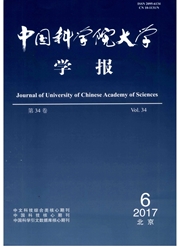

 中文摘要:
中文摘要:
最新报道脂肪酸合酶(FAS)是治疗肥胖症的潜在靶部位.实验测定表明,中药首乌藤的提取物对FAS具有很强的抑制作用,半抑制质量浓度为(0.61±0.024)μg/mL.同时测定,该提取物对FAS中的酮酰还原反应有强抑制,半抑制质量浓度为(2.14±0.12)μg/mL,说明FAS中的酮酰还原酶是该提取物的作用部位之一.抑制动力学分析表明,首乌藤提取物对FAS的抑制和底物乙酰辅酶A、丙二酸单酰辅酶A之间皆呈非竞争性关系;和NADPH之间在低抑制剂质量浓度下的表现近似反竞争性,在高抑制剂质量浓度下接近竞争性的关系.推测首乌藤中可能有多种FAS抑制剂.用首乌藤提取物口服饲喂大鼠和小鼠,可明显减低实验动物的摄食量和体重;测定实验组大鼠肝脏的FAS活性,明显低于对照组.实验结果对于研究FAS抑制剂和抑制机制以及在防治肥胖症的应用上可能具有重要的价值.
 英文摘要:
英文摘要:
Fatty acid synthase (FAS, E. C. 2.3.1.85) played an essential role in fatty acid synthesis, and recently it has been reported as a potential new therapeutic target for obesity; Tuber fleeceflower stem ( Caulis polygoni multiflori) was a traditional Chinese medicine. Our study showed that tuber fleeceflower stem extract (TFS) could potently inhibit FAS. 40 % ethanol behaved best in extracting FAS inhibitors from tuber fleeceflower stem. The half inhibition concentration (IC50) of TFS on FAS overall reaction was (0.61± 0.024)μg/mL, equivalent to dried herb weight of (3.48 ± 0.14)μg/mL. The inhibition kinetics revealed that the inhibition on FAS by TFS was non- competitive against substrate acetyl-CoA and malonyl-CoA, but it was more complicated against NADPH, and potent inhibitors in TFS appeared to be various. Moreover, TFS could inhibit ketoacyl reduction of FAS with an IC50 value of (2.14 ± 0.12)μg/mL, which indicated that ketoacyl reductase in FAS was one of the reacted sites that TFS attacked. In addition, TFS significantly reduced food intake and body weight of diet-induced obesity SD rats and mice via oral administration ; FAS activities in livers of the tested rats were lower than that of the control rats. These results would be very useful for the study of EAS inhibitors and the control of obesity.
 同期刊论文项目
同期刊论文项目
 同项目期刊论文
同项目期刊论文
 The isolation of 1,2,3,4,6-penta-O-galloyl-beta-D-glucose from Acer truncatum Bunge by high-speed co
The isolation of 1,2,3,4,6-penta-O-galloyl-beta-D-glucose from Acer truncatum Bunge by high-speed co Novel and potent inhibitors of fatty acid synthase derived from catechins and their inhibition on MC
Novel and potent inhibitors of fatty acid synthase derived from catechins and their inhibition on MC Inhibitory Effects on Bacterial Growth and β-ketoacyl-ACP Reductase by Different Species of Maple Le
Inhibitory Effects on Bacterial Growth and β-ketoacyl-ACP Reductase by Different Species of Maple Le 期刊信息
期刊信息
